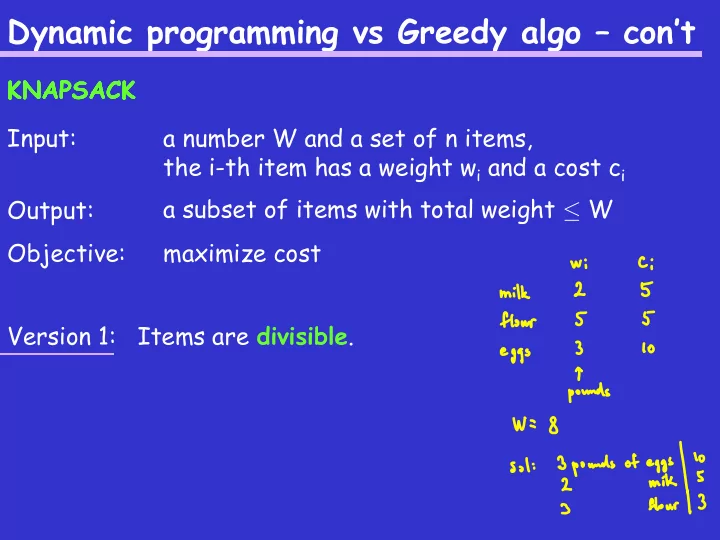

Dynamic programming vs Greedy algo – con’t KNAPSACK KNAPSACK KNAPSACK KNAPSACK Input: a number W and a set of n items, the i-th item has a weight w i and a cost c i a subset of items with total weight · W Output: Objective: maximize cost Version 1: Items are divisible .
KNAPSACK – divisible: a greedy solution KNAPSACK-DIVISIBLE(n,c,w,W) 1. sort items in decreasing order of c i /w i 2. i = 1 3. currentW = 0 4. while (currentW + w i < W) { 5. take item of weight w i and cost c i 6. currentW += w i 7. i++ 8. } 9. take W-currentW portion of item i Correctness: Running time:
KNAPSACK – indivisible Version 2: Items are indivisible. Does previous algorithm work for this version of KNAPSACK?
KNAPSACK – indivisible: a dyn-prog solution The heart of the algorithm: S[k][v] =
KNAPSACK – indivisible: a dyn-prog solution The heart of the algorithm: S[k][v] = maximum cost of a subset of the first k items, where the weight of the subset is at most v
KNAPSACK – indivisible: a dyn-prog solution The heart of the algorithm: S[k][v] = maximum cost of a subset of the first k items, where the weight of the subset is at most v KNAPSACK-INDIVISIBLE(n,c,w,W) 1. init S[0][v]=0 for every v=0,…,W 2. init S[k][0]=0 for every k=0,…,n 3. for v=1 to W do 4. for k=1 to n do 5. S[k][v] = S[k-1][v] 6. if (w k · v) and (S[k-1][v-w k ]+c k > S[k][v]) then 7. S[k][v] = S[k-1][v-w k ]+c k 8. RETURN S[n][W]
KNAPSACK – indivisible: a dyn-prog solution The heart of the algorithm: S[k][v] = maximum cost of a subset of the first k items, where the weight of the subset is at most v KNAPSACK-INDIVISIBLE(n,c,w,W) 1. init S[0][v]=0 for every v=0,…,W 2. init S[k][0]=0 for every k=0,…,n Running 3. for v=1 to W do time: 4. for k=1 to n do 5. S[k][v] = S[k-1][v] 6. if (w k · v) and (S[k-1][v-w k ]+c k > S[k][v]) then 7. S[k][v] = S[k-1][v-w k ]+c k 8. RETURN S[n][W]
KNAPSACK – indivisible: a dyn-prog solution The heart of the algorithm: S[k][v] = maximum cost of a subset of the first k items, where the weight of the subset is at most v KNAPSACK-INDIVISIBLE(n,c,w,W) 1. init S[0][v]=0 for every v=0,…,W 2. init S[k][0]=0 for every k=0,…,n How to 3. for v=1 to W do output a 4. for k=1 to n do solution ? 5. S[k][v] = S[k-1][v] 6. if (w k · v) and (S[k-1][v-w k ]+c k > S[k][v]) then 7. S[k][v] = S[k-1][v-w k ]+c k 8. RETURN S[n][W]
Recommend
More recommend